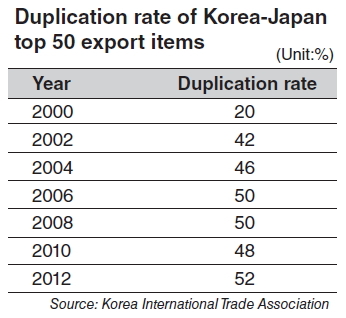Weak yen to take toll on Korean exports
Range of goods exported by Korea, Japan more similar than ever
By Seo Jee-yeonPublished : Jan. 28, 2013 - 19:48
More than half of the top 50 export items from Korea and Japan overlapped in 2012, raising concern over a possible sharp fall in the nation’s outbound shipments amid the weakening Japanese yen, according to a research institute.
The duplication rate of Korea and Japan’s top 50 export items hit a record high of 52 percent in 2012, LG Economic Research Institute, or LGERI, said based on trade data from the Korea International Trade Association.
The rate started to soar in the early 2000s. In 2000, only 20 percent of the top 50 export items between the two countries overlapped, but the rate surged to 40 percent in 2002 and reached 50 percent in 2006 for the first time. The overlap continued to increase over each of the past 10 years except 2010.

“The degree of overlapping deepens in the top 10 of export items. About 90 percent of the top 10 export items of the world’s ninth-largest exporting country overlapped with those of Japan,” the LGERI report said. The top nine made-in-Korea products in competition overseas with Japanese goods include electric and electronic goods, machinery products, cars, ships, plastic goods, steel, precision machinery and organic chemistry goods.
Industry watchers forecast Korea could take a big hit from the continued rise of the won’s value, in particular against the yen due to the two countries’ similar industrial strengths.
“Korean cars could fall victim in the recent currency war as local carmakers need more time to secure a competitive edge over Japanese cars in product quality,” analyst Kang Doo-yong from the Korea Economic Research Institute said. “Overseas consumers are likely to turn their eyes to cheaper Japanese cars.”
Hyundai Motor’s dependence on overseas sales has increased. The nation’s flagship auto brand sells six out of 10 vehicles abroad.
“Contrasting with cars, the strong won is expected to deal a smaller blow than expected to such industries as the semiconductor and electronics industries as Korean brands in these areas have differentiated themselves from Japanese rivals,” Kang said.
LGERI, however, warned of the long-term trend of a strong won. The won has soared 27 percent against yen since the beginning of 2012 till the second week of January this year. The decline of the yen has accelerated since November last year as the Bank of Japan sought more aggressive monetary easing policies to boost its sluggish economy. The won’s value also rose 7.4 percent against the dollar in the same period.
By Seo Jee-yeon (jyseo@hearldcorp.com)
The duplication rate of Korea and Japan’s top 50 export items hit a record high of 52 percent in 2012, LG Economic Research Institute, or LGERI, said based on trade data from the Korea International Trade Association.
The rate started to soar in the early 2000s. In 2000, only 20 percent of the top 50 export items between the two countries overlapped, but the rate surged to 40 percent in 2002 and reached 50 percent in 2006 for the first time. The overlap continued to increase over each of the past 10 years except 2010.

“The degree of overlapping deepens in the top 10 of export items. About 90 percent of the top 10 export items of the world’s ninth-largest exporting country overlapped with those of Japan,” the LGERI report said. The top nine made-in-Korea products in competition overseas with Japanese goods include electric and electronic goods, machinery products, cars, ships, plastic goods, steel, precision machinery and organic chemistry goods.
Industry watchers forecast Korea could take a big hit from the continued rise of the won’s value, in particular against the yen due to the two countries’ similar industrial strengths.
“Korean cars could fall victim in the recent currency war as local carmakers need more time to secure a competitive edge over Japanese cars in product quality,” analyst Kang Doo-yong from the Korea Economic Research Institute said. “Overseas consumers are likely to turn their eyes to cheaper Japanese cars.”
Hyundai Motor’s dependence on overseas sales has increased. The nation’s flagship auto brand sells six out of 10 vehicles abroad.
“Contrasting with cars, the strong won is expected to deal a smaller blow than expected to such industries as the semiconductor and electronics industries as Korean brands in these areas have differentiated themselves from Japanese rivals,” Kang said.
LGERI, however, warned of the long-term trend of a strong won. The won has soared 27 percent against yen since the beginning of 2012 till the second week of January this year. The decline of the yen has accelerated since November last year as the Bank of Japan sought more aggressive monetary easing policies to boost its sluggish economy. The won’s value also rose 7.4 percent against the dollar in the same period.
By Seo Jee-yeon (jyseo@hearldcorp.com)









![[Hello India] Hyundai Motor vows to boost 'clean mobility' in India](http://res.heraldm.com/phpwas/restmb_idxmake.php?idx=644&simg=/content/image/2024/04/25/20240425050672_0.jpg&u=)








